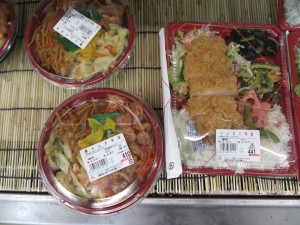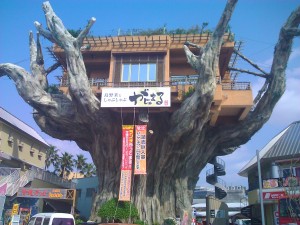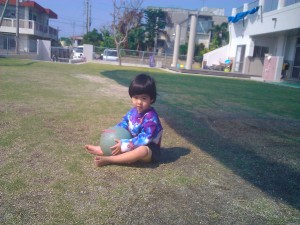Vagabonding field reports: Once Upon a Time in Okinawa
Once upon a time in Okinawa people were so healthy and happy that many of them lived more than one hundred years. The legend says it was because of their special diet, the very active lifestyle (Okinawa is the motherland of Karate) and the strong sense of community that keep everyone together. Still today Okinawa enjoys not only the highest life expectancy but the world’s longest health expectancy. I came here to find out why.
Cost/day
3000 yen (37$) Sleeping was 1000 yen a night, eating little less than 1000 yen, extras 1000 yen.
What’s the strangest thing you’ve seen lately?
Lunch pack culture. Perhaps you have heard about Bento Box, but if you have never been in Japan you may not expect that in any Supermarket or the many Convenience stores that pops out everywhere, you can find such a great selection of just “cooked and packed” food. As much as I like cooking, there is little point in prepare your meal when you have so many yummy options available.
It is also cheaper in most cases to buy a pre cooked meal than cooking, especially in late hours, when the price is heavily discounted because otherwise the day after it will be just thrown away. And remember: the safety standards are probably the highest in the world.
Describe a typical day:
I spent more than two weeks exploring Naha and surroundings, with particular attention to markets and neighborhoods where I could find a traditional living. Unfortunately the island has changed so much in the last years, that new generations of Okinawan are struggling to keep the healthy habits of their ancestors. Except for North of the island (which I have not been yet) everything is now overbuilt like the rest of Japan. And with the addition big of american military bases, Okinawa youngster “enjoy” plenty of american fast foods.
It is said Naha has a great nightlife, but after dark I’ve always been quiet in my guesthouse, working on the computer and chatting with other guests.
Describe an interesting conversation you had with a local:
The hostel where I stayed was packed with longterm Japan residents. I had impression that they all escaped from mainland Japan and a society too demanding, but in my eyes they looked or gassed out or unable to slow down. In fact, some of them were just vegetating, leaving their dorm cubicle just for eating and smoking or watching tv.
Others, like the volunteers staff, where keep working huge hours. There was a guy who was working 5 night shifts a week in a convenience store, or Mittsu, that not only had to give 24 hours a week in the guesthouse to get a free dorm, she was working 3 hours a day in a café to pay nothing more than her meals and little extras.. So, I asked, did you came to Okinawa to relax? Yes..what am I doing? She wondered perplexed to herself before looking at me.
What do you like about where you are? Dislike?
I liked that after all Okinawa retains a relaxed vibe. The place has still a feeling of unicity, a mix of cultures you wont’ find everywhere.
I disliked that while for the moment the Japanization and Americanization of Okinawa gave to this place more diversity, the changing is happening too fast and I wonder how much of Okinawan fantastic culture can survive.
Describe a challenge you faced:
One day in my guesthouse I met Jup Brown, a New Zealander who is living on and off Japan for 18 years. He told me the next day he was going to start S-Miling. In other words he was up to running the whole country for charity: 4200km in 90 days, and he wanted some company. So I decided to join him for two consecutive days. I run (33+40) 73 km. Ok, lots of walking too, but still, it’s almost the distance of a Marathon and with no preparation. It was a great, fun experience and less painful than expected.
What new lesson did you learn?
A lesson I need to learn again and again: manage your expectations. Okinawa turned out to be a different place from the mental image I had formed before come here. I arrived to experience the lifestyle of his many centenarians, but even more than the language barrier, the main obstacle was the big changes occurred in the last years. I don’t think it’s possible not having expectations at all, but we need to be ready to put them apart, especially when you are on the road and want to experience a new culture.
Where next?
After more than 3 weeks in Japan I still feel not able to tune in with the country. My main obstacles so far have been the language barrier and my expectations. So I need to find a quiet place where study Japanese, relax and experience the countryside. When I realized the 80km bus ride to the North of Okinawa, where I couldn’t find any cheap accommodation, cost me almost the same money of the 300km flight to the island of Miyako in the South, famous for the best beaches in the country, my choice was easily made.




Category: Asia, Food and Drink, Languages and Culture, Vagabonding Field Reports